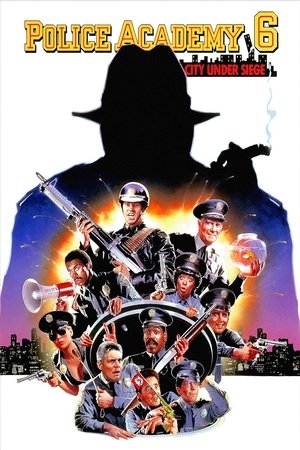
Police Academy 6: City Under Siege
**Despite being a family friendly comedy, the quality level has dropped a lot, when compared to the first films of the same franchise.** The “Police Academy” franchise is increasingly showing signs of wear and tear. After a film far weaker than any of its predecessors, I had hoped that attempts had been made to improve things a little. However, this film is at least as weak as its immediate predecessor. However, that doesn't mean it's a bad movie, quite the opposite. There are much worse and much better rated films out there, and the comedy of this film is quite friendly and familiar, unlike what happens in many other comic films, where the humor is pure and simply dirty. This is an enjoyable movie and sometimes even has some fun… it's just not as good as its predecessors. The script is based on a series of attempts to stop a group of bandits from carrying out a series of crimes and robberies in a certain area of the city. Obviously, Lassard and Harris will be together to do it, and Harris is only concerned with his own career progression and continues to be the preferred target of the cop trolls we already know. The script is not brilliant, but it manages to support the film in the way it was conceived and executed. It turns out that the quality level is now very low, and this can also be seen in the poverty of the dialogues, in the amount of clichés and situations that, instead of making us laugh, make us wonder to what extent the screenwriter was a competent person. The cast does what they can with what they've been given, but they don't have the space or material to stand out anyway. Bubba Smith assumes an unquestionable protagonism, but he doesn't have a character or even material that makes him stand out more. Michael Winslow does what he can, but he doesn't stand out much either. Easterbrook and Ramsey are a shadow of what they were in other films. Matt McCoy is no joke and shouldn't be here. Villains can be more idiotic and childish than the Looney Tunes and George Gaynes, as respectable as he is, turned his character into an old man with no memory or sense of the ridiculous. Who is still standing out in some way is G.W. Bailey, but this happens mainly because of the ridiculous situations in which he ends up involved. Technically, there isn't much to say about this film. It seeks to maintain the characteristics and visual aspect of its predecessors, with standard cinematography, conventional editing and few notable effects, in addition to the shots and some interesting situations, such as the one in which Tackleberry writes with his machine gun. Everything else is simply more of the same and doesn't deserve a specific mention.
